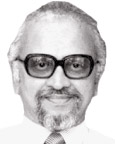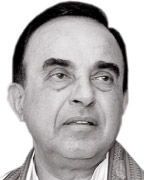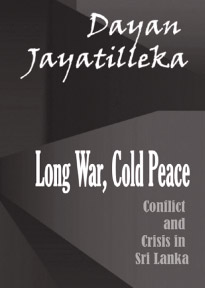|
Continuing review of Dr. Dayan Jayatilleka’s book,
Long War, Cold Peace:
India the cause not the solution for Sri Lankan problems
  H. L. D. Mahindapala H. L. D. Mahindapala
According to my friend Dayan Jayatilleka's own admission his latest
book, Long War, Cold Peace, was rushed to the printer's in the hope of
getting it out on time to impact on the UNHRC session in March -- a
critical session in which the big powers, including India, were
preparing to nail Sri Lanka. This, of course, implies that it was meant
to be more of a political tract than a scholarly book exploring in-depth
the pros and cons (in Marxist jargon "dialectics/contradictions") of the
post-Nandikadal complexities, particularly the external forces poking
their unwanted fingers in the Sri Lankan kiri buth. Besides, the main
thrust of the book doesn't indicate that it was written to defend Sri
Lanka.
On the contrary, the contents, by and large, go to back the anti-Sri
Lankan forces. For instance, in his book he cites approvingly the latest
anti-Sri Lankan international mafia consisting of Frances Harrison, the
BBC correspondent who is still counting the dead, Gordon Weiss who is
caged in his own phobias and fantasies and even S.V. Kirubukaran, the
pro-LTTE activist from Paris who is a permanent anti-Sri Lankan feature
in the lobbies of the UNHRC in Geneva. Dayan picks up every bit of muck
thrown at Sri Lanka by these one-eyed Jacks and Jills and hails each bit
as a part of the growing external forces that are rising to flatten Sri
Lanka in one single stroke. He even cites in one of his recent articles
a posting in the CNN made by a member of the TGTE (Tamil Ghost of Tiger
Eelam) -- the mythical government of Jaffna Tamils which can't even
issue a visa to its bogus Prime Minister, V. Rudrakumaran in New York,
to go to the toilet next door -- as another piece artillery fired at the
GOSL. Reading all this one does not have to be a political scientist to
guess on whose side Dayan is right now.
For good or for bad, his book couldn't make the Geneva deadline. Most
probably, he was hoping it would be his equivalent of Channel 4 films.
What better authority than a former representative of Sri Lanka at the
UNHRC to demonise Sri Lanka! But Vijitha Yapa's printing schedules
failed to make it in time for Geneva. This, however, hasn't prevented
his text being quoted by his favourite anti-Sri Lankan propagandists
like Gordon Weiss. Quoting an ex-diplomat of the Sri Lankan government
lends greater authority to anti-Sri Lankan lobbyists abroad than their
own voices.

Dr. Subramaniam Swamy |

Gordon Weiss |

Hillary Clinton |
This raises a serious moral question. The Sri Lankan situation at the
11th session of UNHRC in Geneva (March 27, 2009) was not radically
different from what it is today. It was the first post-conflict session
of the UNHRC in Geneva. As stated by Dayan, within a matter of hours
Hillary Clinton pushed the EU to move the resolution against Sri Lanka.
More importantly, she moved against Sri Lanka with hardly any evidence
-- not even a cooked up one like that of Colin Powell against Iraq -- to
put Sri Lanka on the mat. They were out to get Sri Lanka. They were
playing politics. They were determined to teach Sri Lanka that it can't
do what America does day in day out to protect its internal security,
with or without Indians tightening their turbans round their giddy
heads.
International arena
The only significant change since then has been India's stance
against Sri Lanka. According to Dayan, it is India's stance that is
critical for victory in the international arena. So was the victory in
Geneva due to his diplomatic skills or due to his following the Indian
line abandoning the long-term interests of Sri Lanka? India's line was
to commit Sri Lanka internationally to the 13th Amendment. Dayan's
resolution did just that. Since that is the reality should the credit
then go to Dayan or to India? According to Dayan's logic, any Sri Lankan
donkey can win in the international arena if it follows the Indian line.
So on what basis does Dayan claim it to be a personal victory for his
diplomatic skills when he admits that to win all what is necessary is to
say "yes sir, no sir, three bags full sir", to India? Does he consider
such a subservient role as diplomatic skill or stooging?
There is no rationale for any self-respecting Sri Lankan --
particularly in view of the political and administrative costs and
failures caused by the 13th Amendment for the last 25 years – to
perpetuate the 13th Amendment as God's gift to Sri Lankans. Its presence
in the Statute Book is the most degrading insult to Sri Lankan dignity
and self-respect. Why? The 13th Amendment is the ultimate symbol of
naked Indian imperialism. All of Dayan's political theory -- Marxist or
otherwise – should have made him recognise instantly the nature of
Indian intervention. Even Indian commentators have gone as far as saying
that India's interventions amounts to "bullying" of a small nation. As a
"political scientist" he should have been the first to spot the
imperialistic character of Indian arm-twisting to serve Indian
interests. As an anti-imperialist Marxist it should have been his moral
duty to condemn India's role in Sri Lanka. Instead he welcomes it as a
benign act of a benefactor whose aim is to restructure Sri Lanka
according to his gospel.
 Throwing out the 13th Amendment is only way to kick Indian
imperialism out of Sri Lanka. Right now India is piqued and highly
agitated because Sri Lanka is making a strong bid to overthrow the
Indian yoke. However tardy it may be there is an established tradition
of Sri Lankans working out their own salvation through their native
genius. For instance, it may have taken 33 years to end the Vadukoddian
violence launched by the northern Tamil leadership. But they did end the
war triumphantly by (1) saving the lives of 300,000 Tamils held as
hostage and, above all, (2) restoring normalcy and democracy to the
Tamils of the north who were suppressed under the jackboots of the
brutal Tamil Pol Pot. America, after ten years and spending $60 billion,
is still struggling to avoid anarchy in Iraq, let alone restoring
normalcy. Throwing out the 13th Amendment is only way to kick Indian
imperialism out of Sri Lanka. Right now India is piqued and highly
agitated because Sri Lanka is making a strong bid to overthrow the
Indian yoke. However tardy it may be there is an established tradition
of Sri Lankans working out their own salvation through their native
genius. For instance, it may have taken 33 years to end the Vadukoddian
violence launched by the northern Tamil leadership. But they did end the
war triumphantly by (1) saving the lives of 300,000 Tamils held as
hostage and, above all, (2) restoring normalcy and democracy to the
Tamils of the north who were suppressed under the jackboots of the
brutal Tamil Pol Pot. America, after ten years and spending $60 billion,
is still struggling to avoid anarchy in Iraq, let alone restoring
normalcy.
Giving Sri Lanka the breathing space to work out its own paths to
peace, reconciliation and progress is the prime need of the hour. Dayan
in his Geneva resolution too argued on "the principle of
non-interference in matters which are essentially within the domestic
jurisdiction of tates". Despite the pompous rhetoric India has to yet to
convince the world that it is committed to the Gujral or Panchaseela
doctrines. The Sri Lankans have to fight back to regain their freedom
and their right to solve their problems without Indian interventionists
assuming the pretentious role of having answers to Sri Lankan problems.
The Indians must first prove that they have the capacity to solve their
own problems -- from Kashmir to Arunachal Pradesh -- before they step in
to solve their neighbours' problems. On top of this, the irony is that
India expects Sri Lanka to be beholden to the Big Brother each time the
bully kicks Sri Lanka in the guts. Sri Lanka owes nothing to India --
not even the help it gave in the last stages -- because as Lalith
Weeratunga, President's Secretary, said recently Sri Lanka would not be
in this position if India kept its hands off Sri Lanka.
Furthermore, the Jaffna Tamils are realistic enough to realize that
the 13th Amendment was not introduced to serve their interests. If so
they wouldn't have opposed it with guns and going as far as
assassinating the Indian author of the 13th Amendment. The merged north
and east was the best strategic deal devised by the Indians to
consolidate their position in the Indian Ocean. Having their proxy in
command over the Trincomalee harbour was better than the Chinese having
a foothold in Hambantota. With the 13th Amendment we were not handing
over power to the Jaffna Tamils. We were handing over the entire
northern and eastern coastal belt to the proxies of Indian puppet
masters. This was confirmed in the case of Varatharaj Perumal, the first
stooge of India. And it is revealed even now with TNA being summoned to
Delhi to hold pow-wows on how to further mutual interests.
From the word go, the 13th Amendment has been the legalised backdoor
in Sri Lanka for India to manipulate politics in its southern flank.
Nobdoy wanted it -- not even the TULF or Prabhakaran. Dayan knows only
too well that it was pushed down the throats of all communities and
political parties by India through gun boat diplomacy. His distinguished
father, Mervin de Silva, has written enough and more on this topic.
Besides, if, by any chance, India had done this to Cuba -- Dayan’s ideal
Marxist state run by “Saint Castro” -- he would be doing an
anti-imperialist Kavadi, in his loin cloth, opposite the South Bloc in
Delhi, with Ranil Wickremesinghe and Sampanthan beating the Indian drums
to the Tamil extremist rhythm of “Goo-ooo-urang! Goo-ooo-urang!”
India's foreign policy
The 13th Amendment was India's solution to India's neo-colonial
problems caused by India's determination to get a foothold in Sri Lanka.
It was the veneer for painting India as the goody-goody benefactor when
in reality it was the creator of the political evil of destabilising Sri
Lanka through the violence of Tamil terrorism bred in the womb of mother
India, Mrs. Indira Gandhi, the vindictive face of Indian politics.
India's foreign policy is based on the hypocrisy that it has been the
protector and benefactor of Sri Lanka without acknowledging its
unpardonable crime of violating international law, war crimes and crimes
against humanity every step of the way, starting from training camps in
India to the failed IPKF operations. My friend Susantha Gunatilake has
convincingly demonstrated the reaction of the unofficial international
community, represented by The New York Times, The Guardian etc., (Daily
News -- 6/6/2013), exposing India's violation of international law by
invading Sri Lanka on the pretext of dropping humanitarian assistance.
Furthermore, the 13th Amendment has not served any positive or
significant Sri Lankan interests, either for any community or the nation
as a whole. It has created more problems than solving any. But since
1987 when it was introduced India needed international respectability
and legitimacy for its imperialistic interventions in Sri Lanka. Dayan
was the first to give that legitimacy in an international forum, in
writing, by including the 13th Amendment in his Resolution in March
2009. And having done that he and his allies in India and Tamil diaspora
are using it as the legal bench mark against Sri Lanka.
Right now he seems be obsessed with the aim of pushing the 13th
Amendment as the panacea to all the national and international problems
facing Sri Lanka. Irrespective of the rapidly changing dynamics of the
post-Nandikadal developments he sticks doggedly to the 13th Amendment.
His ideological roots go back to the time when he was a minister in the
puppet regime of Varadaraja Perumal who was a slimy stooge of India.
Eventually, Dayan together with his leader, Vardaraja Perumal, found
refuge in India. India, pursuing its self-interests, naturally harbours
its agents who serve its foreign interests. Perhaps, it is either
loyalty to India or the mistaken belief that India can do whatever it
wants in the Indian Ocean -- including what Michael Ondaatjee's
grandmother did, "piss into it" (See Running in the Family)-- that makes
Dayan feel that Sri Lankans are there to polish Indian shoes.
Humanitarian assistance
Of course, in the resolution steered by him in 2009 at the UNHRC he
had committed Sri Lanka "to a political solution with the implementation
of the 13th Amendment to bring lasting peace and reconciliation in Sri
Lanka." Whether it was necessary for him to go that far -- mainly to
appease India – is questioned by cool-headed, senior diplomats who would
have handled the situation more expertly without pushing Sri Lanka into
a difficult corner by committing itself to India's 13th Amendment. In
hindsight, it is clear that he should have confined the commitment "to a
political solution to bring lasting peace and reconciliation in Sri
Lanka." That would have confirmed him as a sagacious, far-seeing, adroit
"political scientist" who had foreseen the coming events and outfoxed
the enemies threatening the security and the overall interests of the
nation. But he was blinded by his commitment to the 13th Amendment which
he should have known was a cure worse than the disease. It was an Indian
move that even the Indian forces -- the fourth largest army in the world
-- could not implement through its puppet Varathraja Perumal or enforce
to subdue Prabhakaran -- the monster created by India. As a realist, let
alone political scientist, he should have seen it coming. Trying to
force it down the throat of the nation now by raising the bogey of
Indian goni-billa does not justify his claims to be a political
scientist who can read the future.
Moreover, nothing that was inscribed by him in the resolution of 2009
including --1. the principle of non-interference in matters which are
essentially within the domestic jurisdiction of States, 2. the
liberation tens of thousands of its citizens that were kept by the LTTE
against their will as hostages, as well as the efforts by the Government
to ensure safety and security for all Sri Lankans and bringing permanent
peace to the country; 3. the duty and responsibility (of the state) to
provide protection and humanitarian assistance to all segments of the
population, including Internally Displaced Persons (IDPs), without
discrimination; 4. reaffirming the obligations of States to respect
human rights law and international humanitarian law while countering
terrorism (Dayan agrees it was just war fought with less violations of
humanitarian law than US etc); 5. reaffirming the respect for
sovereignty, territorial integrity and independence of the Democratic
Socialist Republic of Sri Lanka, and its sovereign rights to protect its
citizens and combat terrorism, 6. condemning all attacks that the LTTE
(Liberation Tigers of Tamil Eelam) launched on the civilian population
and its practice of using civilians as human shields; 7. recognizing
that the promotion and protection of human rights should be based on the
principle of cooperation and genuine dialogue and aimed at strengthening
the capacity of Member States to comply with their human rights
obligations for the benefit of all human beings -- mattered to the West
and the anti-Sri Lankan lobbies. Any commitment by the GOSL to implement
LLRC/13th Amendment didn't matter either. They were determined to run
over Sri Lanka like a steam roller.
So why is Dayan stoking the fires of that steam roller now? Is it
because he feels that his 2009 "victory" in Geneva has not produced any
lasting benefit to the nation? It cannot be considered as a landmark
victory because it evaporated in the next sessions. His role in 2009 can
be dismissed as a pyhrric victory which helped India more than Sri
Lanka. In fact, the West could claim that they feel vindicated and
justified in opposing his resolution because the very man who steered
the resolution is now arguing against the nation he represented,
regurgitating the accusations of the West. Since nothing substantial had
changed between 2009 and the time he wrote the book -- all the
blackmarks he highlights in his book were there in 2009 too -- his moral
obligation is to jettison the imperialistic flotsam and jetsam on board
and stand by the main objective of defending the nation. But when he
goes against his own resolution what is the obligation for others to
uphold it?
Diplomatic skills
What Dayan has failed to recognise is that his current stand is
condemned in the words of his own resolution. (I refer to 2009
Resolution as "his resolution" because, rightly or wrongly, he claims
ownership of victory to his diplomatic skills. Secondly, a section of
the Foreign Ministry states Dayan interpolated some parts --particularly
the reference to the 13th Amendment -- on his own initiative to appease
India.)
Among other things, his resolution said that the UN "(W)elcomes the
resolve of the Sri Lankan authorities to begin a broader dialogue with
all parties in order to enhance the process of political settlement and
to bring about lasting peace and development in Sri Lanka based on
consensus among and respect for the rights of all the ethnic and
religious groups inhabiting it and invites all stakeholders concerned to
actively participate in it." The operative part of it states
categorically the need to "enhance the process of political settlement
and to bring about lasting peace and development in Sri Lanka based on
consensus among and respect for the rights of all the ethnic and
religious groups inhabiting it and invites all stakeholders concerned to
actively participate in it." In brass tacks, this means that any
consensus must contain the consent of both the north and the south.
History has rejected the misleading notion that the 13th Amendment
introduced to appease the Indian and Jaffna political leaderships adds
up to a consensual agreement that would fulfill the aspirations of all
communities. That cannot be the meaning of consensus because it applies
only to one community, plus India.
Nor will the rights of all ethnic groups be fulfilled only by
implementing the 13th Amendment because it violates the rights of
non-Jaffna Tamil ethnic groups. And since he knows, through existential
experience, that the 13th Amendment, has been bone stuck in the throat
of ethnic groups the consensus has to "begin (with) a broader dialogue
with all all parties/stakeholders."
His resolution ended by urging "the international community to
cooperate with the Government of Sri Lanka in the reconstruction
efforts, including by increasing the provision of financial assistance,
including Official Development Assistance, to help the country fight
poverty and underdevelopment and continue to ensure the promotion and
protection of all human rights, including economic, social and cultural
rights." So where does this leave Dayan when he is condemning his own
resolution and aligning himself with the pro-13th Amendment forces?
Internal affairs
His obsession with the13th Amendment blinds him to the unravelling
dynamics of the post-Nandikadal developments. This is partly driven by
his over-exaggerated impression of India's power in global affairs which
even the Indians do not believe in. Indian analysts like Dr. Subramaniam
Swamy are warning India not to overreact and alienate Sri Lanka. Swapan
Dasgupta of the BJP too has taken a broad swipe at the external
interlopers meddling in the internal affairs of Sri Lanka.
Identifying the current source of interference as the Tamil diaspora
he says: "Today, the LTTE has been militarily defeated but the diaspora
funds are being used to keep alive the old Sinhalese-Tamil divide in
politics and international relations . There is peace and growing
prosperity in the Tamil areas, and only the political loose ends remain.
This in itself is a challenge but the reconciliation process isn’t
helped if the diaspora is determined that its unchanging historical
memory and hateful vision for the future must set the tone for the
country they left behind."
This statement conveys a profound meaning to the current situation.
He is just not blaming the Tamil diaspora for funding “to keep alive the
old Sinhala-Tamil divide and international relations”. He goes further
and puts his finger in the right place when he says that “the diaspora
is determined that its unchanging historical memory and hateful vision
for the future must set the tone for the country they left behind.”
Isn’t Dayan too afflicted by the same “historical memory and hateful
vision for the future...”?
In a sense, Dasgupta is also hinting at India’s interventionist
policies when he says: “Imagine our reaction if India’s politics was
sought to be remote-controlled from Southall and New Jersey.” Indeed!
Dasgupta is right again when he says that the “remote-control” button
must be switched off, permanently. It must begin with India -- the
mother of all Sri Lankan problems. Any concessions to India like the way
Dayan did in Geneva is going to bedevil Sri Lankan politics further.
Post-independence history proves that Indian imperialist interventions
have dragged Sri Lanka and India into the depths of varied disasters.
India could have achieved better results if its spent the money and the
IPKF forces in the poverty-stricken state of Chattisgarh where it is
facing, according Prime Minister Manmohan Singh, the most dangerous
threat from the Maoists to its peace, stability and progress.
SAARC region
Moreover, the time has come for India to calculate the cost benefit
ratio of its interventions. What has India gained so far except loss of
face and humiliation at the hands of a Sinhala naval rating and finally
death to the author of the 13th Amendement? If Indian continues to
pursue its current aggressive stand against Sri Lanka it is bound to
boomerang on its own security in the region. India will find it more and
more difficult to manage her economic, political and strategic interests
in the southern flank if she attempts to bulldoze her way into Sri
Lanka. Nobody likes a bully. And India should not make the same mistake
twice.
In the resolution steered by Dayan in 2009 at the UNHRC he had gone
too far to appease India with no positive gains either for India or Sri
Lanka. Dayan’s “victory” in Geneva was only a side show for India. Her
most substantial victory was in Nandikadal. Eventually, India was
rescued by Sri Lanka in Nandikadal. Defeating Prabhakaran -- the
assassin who killed their Prime Minister -- stands out as, perhaps, the
biggest victory India scored in the region. As President Mahinda
Rajapaksa said once: “We fought India’s war and won!” Three cheers for
that, Mr. President!
After handing over Prabhakaran’s head to India -- a feat that India’s
army failed to achieve -- it has no role in Sri Lanka except to assist
Sri Lankans to tie up “only the political loose ends (that)
remain”.(Swapan Dasgupta). This can be achieved only if India backs off.
It can’t be solved by Dayan raising the bogey of Indian goni-billa.
India should be mature enough by now not to put its boots down in their
neighbourhood after its repeated miserable failures in the SAARC region.
To be continued
|





